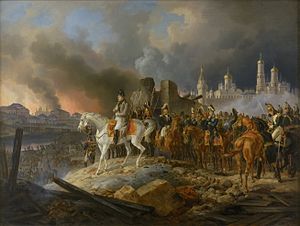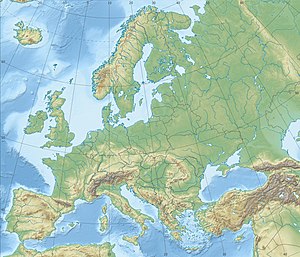| French occupation of Moscow | |||||||
|---|---|---|---|---|---|---|---|
| Part of the French invasion of Russia | |||||||
 Napoleon in burning Moscow by Albrecht Adam, 1841 | |||||||
| |||||||
| Belligerents | |||||||
|
|
| ||||||
| Commanders and leaders | |||||||
|
|
| ||||||
| Strength | |||||||
| 100,000[1]–150,000[2] | Unknown part of about 250,000 inhabitants[3] | ||||||
| Casualties and losses | |||||||
| 30,000[a] | Unknown | ||||||
Location within Europe | |||||||


French Emperor Napoléon Bonaparte's Grande Armée occupied Moscow from 14 September to 19 October 1812 during the Napoleonic Wars. It marked the summit of the French invasion of Russia. During the occupation, which lasted 36 days, the city was devastated by fire and looted by both Russian peasants and the French.[4]
Napoleon's invasion of Russia began on the 24th of June in 1812, and he had made considerable progress by autumn. With French victory in the Battle of Borodino on 7 September, the way to Moscow was open. The opposing Russian army under Mikhail Kutuzov had suffered heavy losses and chose to retreat. A week of close escapes on the part of the Russian army followed. Napoleon and Kutuzov even slept on the same bed in the manor of Bolshiye Vyazyomy just one night apart, as the French chased the Russians down. Napoleon and his army entered Moscow on 14 September. To Napoleon's surprise, Kutuzov had abandoned the city, and it fell without a fight. Hundreds of thousands of civilians fled along with the retreating Russian army, leaving the city nearly empty.
The capture of the city was a hollow victory for the French, as the Russians—most likely on orders of governor Fyodor Rostopchin—set much of the city on fire in a scorched earth tactic (though the cause of the fire is disputed). For four days until 18 September, the city burned. The French, who had intended to pilfer the city for supplies, were now deep in enemy territory without adequate food as winter was approaching. The French thoroughly looted what had not burned, including ransacking churches. French misery was compounded by guerilla warfare by the Cossacks against French supplies, and total war by peasants. This kind of attrition war weakened the French army at its most vulnerable point: logistics.
On 19 October, after losing the Battle of Tarutino, Napoleon and his Grande Armée, slowly weakened by the attrition warfare against him, lacking provisions, and facing the first snows, abandoned the city voluntarily and marched southwards until the Battle of Maloyaroslavets stopped the advance.[5] The retreating French set further fires in the city, and blew up monuments. The Russians retook the city on 19 October, and quelled rioting and looting by peasants. The destruction of the city was considerable: it would take more than half a century to return to its pre-war population.
- ^ Riehn 1990, p. 265.
- ^ a b Егоршина 2023, p. 279.
- ^ Riehn 1990, pp. 263–264.
- ^ Riehn 1990, pp. 285.
- ^ Riehn 1990, p. 321.
Cite error: There are <ref group=lower-alpha> tags or {{efn}} templates on this page, but the references will not show without a {{reflist|group=lower-alpha}} template or {{notelist}} template (see the help page).

